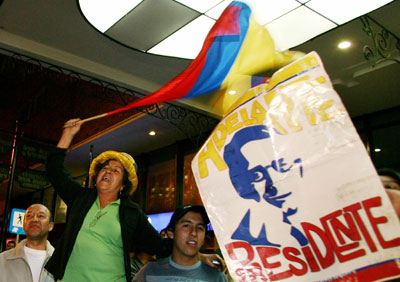President Alvaro Uribe, a key U.S. ally in Latin America, swept to a
landslide victory in an election in Colombia on Sunday, rewarded by voters for
turning around the security threat in a country bloodied by years of conflict
and crime.

Colombians celebrate
Colombian President Alvaro Uribe's second term as President in Bogota, May
28, 2006. Uribe, a key U.S. ally in Latin America, swept to a landslide
victory in an election in Colombia on Sunday, rewarded by voters for
turning around the security threat in a country bloodied by years of
conflict and crime. [Reuters] |
The closest of Uribe's five challengers, Carlos Gaviria of the center-left
Democratic Pole, conceded after official counts showed Uribe leading with more
than 62 percent of the vote.
"What we have to do at this time is recognize the victory of President
Uribe," Gaviria, a former judge, told local radio at his campaign headquarters.
As counting closed, several hundred supporters crowded into Uribe's campaign
headquarters in a Bogota hotel chanting: "Uribe, Uribe, Long Live Colombia."
Caravans of cars with honking horns and people waving the red-yellow-and-blue
national flag drove through the posh district of north Bogota in a noisy
celebration.
The victory by Uribe, a 53-year-old lawyer and landowner, will be welcome
relief for Washington after a string of election victories by leftists in Latin
America and with Venezuelan President Hugo Chavez leading a campaign to counter
U.S. free-market ideas with socialist reforms for the poor.
The election was the most peaceful vote in years in a country where thousands
are killed each year in a now four-decade-old armed conflict.
Troops patrolled the streets of the capital Bogota, high in the Andes
mountains, and across the nation of 41 million people but no major guerrilla
attacks were reported.
The key to Uribe's success has been a crackdown on right-wing militias and
the leftist FARC rebels who use Colombia's cocaine trade to sustain their
insurgency.
Voters praised Uribe for bringing greater security to the cities, although
armed groups still hold sway in much of the countryside. They have welcomed
being able to lead more normal lives in Bogota and other cities after years in
which kidnappings, car bombs and assassinations had been frequent.
"The only thing that worries me somewhat is that Uribe has done a lot for the
rich but not so much for the poor. But in terms of security, he has helped us
out a lot," said housewife Gloria Ospina after voting for Uribe in a
middle-class north Bogota neighborhood.
In a break with past practice, the FARC urged people to vote, apparently
calculating that a campaign of violence on election day would play into Uribe's
hands.
The army reported just a few incidents. Four guerrillas blew themselves up in
eastern Arauca province while preparing explosives and a fifth was killed in a
similar incident outside the city of Cali.
Carlos Vargas, 39, a video editor who lives in Bogota's working-class Ciudad
Bolivar district, said there had been more fear of guerrilla attacks and bombs
in previous elections.
"In the past elections in the town where my family lives in Arauca the
guerrilla took over the town and did not let anyone vote," he said.
PLIGHT OF THE POOR
Uribe says he needs another four years to finish the job. He says he will
offer the 17,000-strong FARC -- the Revolutionary Armed Forces of Colombia --
peace talks but that they must lay down their arms.
Critics say Uribe must pay attention to the plight of the poor who make up
around half of Colombia's population.
Colombia's economy grew a brisk 5.3 percent last year and foreign investment
picked up, but Uribe's opponents called for more social spending in their
campaigns.
In Ciudad Bolivar, people said they wanted more jobs but that Uribe had
helped with social projects.
"We voted for Uribe so that he can conclude all his projects. He is doing it
well. The security system has improved here; before there was not authority
here," said Alfonso Castillon, a 66-year-old invalid.
A stable Colombia is also vital to U.S. interests. The senior U.S. official
for Latin America, Thomas Shannon, met with Uribe during a brief visit to Bogota
on Friday.
Colombian traffickers are the main suppliers of cocaine and heroin to
drug-users in the United States. Washington has pumped more military aid into
Colombia than any other country outside the Middle East in the past four years.